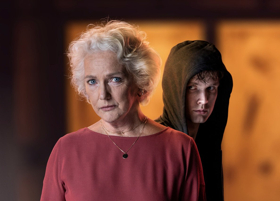Review: VINCENT RIVER, Trafalgar Studios

![]() Anita is not dealing with the murder of her son very well - she drinks, she jokes and she deflects. She does not address what that terrible event has done to her mind.
Anita is not dealing with the murder of her son very well - she drinks, she jokes and she deflects. She does not address what that terrible event has done to her mind.
When the lad who has been stalking her turns up at her new flat, she knows there's more to his story than meets the eye - and so do we, long before Vincent becomes "Vince" in the tales he tells as Anita and Davey trade stories that weave fact and fiction through the pain.
Philip Ridley's play is 19 years old now (about Davey's age) and it shows. Where was the family liaison officer for Anita? Why no mention of counselling nor any other support? Why is pretty much everything that Davey recounts not on surveillance cameras, an often inconclusive means to get to detail, but pretty good on the bigger picture.
That stuff matters because Robert Chevara's transfer from last year's run at the Park Theatre, is clearly (made explicitly so in the programme notes) at least partly a response to the grim post-Referendum uptick in hate crimes.
But are gay men being randomly murdered in Hackney in 2019? It's always dangerous to consign bad people to the past, but London (at least) feels like it has gone past "queer-bashing" (or moved it online). One incident, no matter how low level, is one too many of course, but to deny the advances that gay men and women have made in the last two decades, is to deny the courage of those who stood up for their rights and won them and are still fighting battles today.
To assert that the irrational hatred of LGBT+ people has disappeared from the public realm would be absurd, but the issues seem different now - facing down religious fanatics at school gates or coping with the deluge of micro-aggressions (sometimes a rather more than that) online.
If the play is, or is perceived as, historical rather than contemporary, it loses some of its power.
Not all of it though.
Louise Jameson impresses as the mother who can't grieve, sometimes looking on Davey as a surrogate son, sometimes as a quasi-lover and sometimes as her nemesis, the kid who dragged her perfect, sweet boy into a world of cottaging, internet sex and violence.
Thomas Mahy, despite looking unnervingly like Take That's Mark Owen, excels as Davey, his accent veering off from the mid-Atlantic patois that so enraged David Starkey a few years ago, to a more modulated and articulate North London voice, the one from the streets, but not the gangs. It's a mark of how he finds his identity, his truth-telling a kind of coming out, a liberation if another dagger to the heart of his interlocutor.
Ridley I find demanding - there's a rhythm to his writing that seduces and then overwhelms you, for good or ill. It was there in Dark Vanilla Jungle and in Mercury Fur (both later works) and it's in Vincent River. It's skilful and it connects with people, but my problem is that I feel I'm getting too old to spend much more time in Ridleyworld - a place of pain, of unresolved conflicts, of verbal, and sometimes, literal violence.
There's the real world for all that stuff now.
Vincent River continues at the Trafalgar Studios until 22 June.
Photo Scott Rylander
Reader Reviews
Videos

